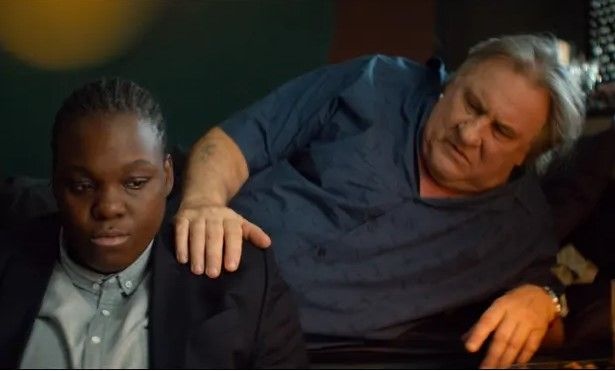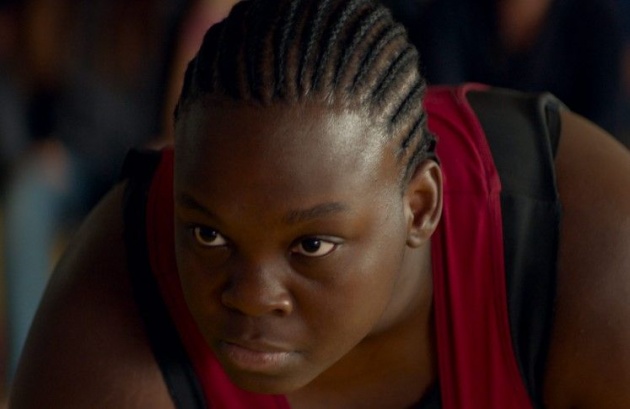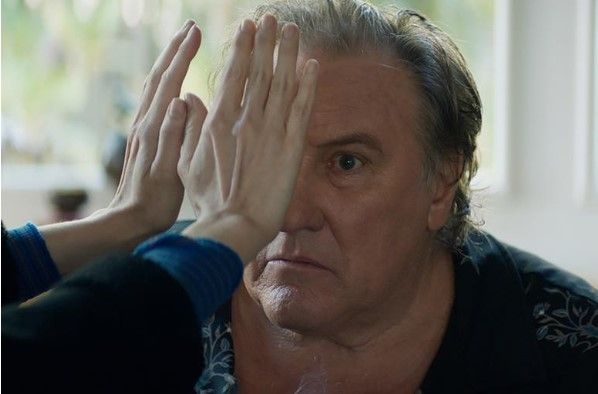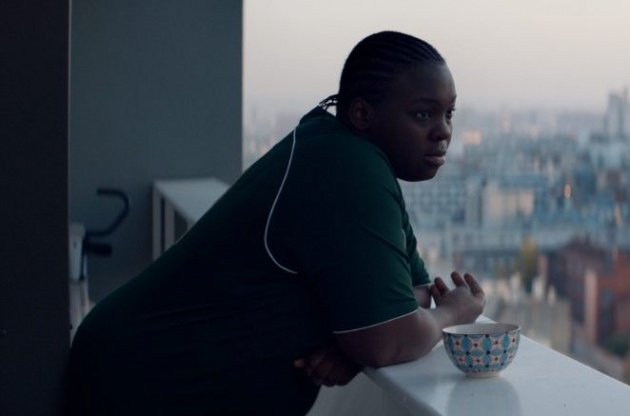
Pictured: 'I've Popeye the sailor's hand.' Georges (Gérard Depardieu) assures his security detail, Aïssa (Déborah Lukumuena) that he's okay in a scene from the French drama, 'Robust', co-written and directed by Constance Meyer. Still courtesy of 606 Film Distribution (UK) / Indie Sales
Robust (Robuste) is the debut feature of French co-writer-director Constance Meyer, who had served as a third assistant director on Jonas Carpignano’s Mediterranea and directed a series of shorts of increasing acclaim, including Rhapsody (2016) and La Belle Affaire (2018). In the latter, she worked with Gérard Depardieu, one of France’s greatest screen actors, who in his prime could play any role and make it convincing, but who now resembles a shipwreck, damaged beyond repair, sunken in his own personal abyss. The joy of Dépardieu the actor – as opposed to the man who claimed Russian citizenship for tax purposes in 2013 and who has been accused of the sexual assault of a young actress in 2018, not to mention instances of drunk driving and urinating in a cabin that have marked the last decade or so – is that there is still an artist’s curiosity and a willingness to appear vulnerable on screen. We sense – or perhaps project – a desire for the actor to be reconciled within himself rather than be one of cinema’s great de-boners, of chicken and of people.
Co-writing the script with Marcia Romano, Meyer conceived the film with Depardieu in mind. It says something about the actor that he accepted the role of cantankerous, emotionally needy and selfish movie star giving it (as far as the audience is concerned) some verisimilitude. When we first meet Georges (Depardieu), his face is encased in a Shark motorcycle helmet as he is about to start up his bike. The scene has particular resonance: Depardieu’s late son, Guillaume, had his leg amputated in 2003 following complications resulting from a motorcycle accident in 1995. (Guillaume died of pneumonia in 2008, aged 37, contracted in Romania whilst filming). Meyer shows Georges crashing his bike; the digital cinematography causing the bike’s red lights to appear blazing like fireballs. Georges survives the crash, but we sense that he didn’t want to. He has recently quit an American film, resulting in a lawsuit. To compensate the American production he has to work again on a costume drama that requires sword fighting – as we discover, he is none too keen on fencing lessons. His crutch is his security detail. However, his minder, Lalou (Steve Tientcheu) has suffered a family bereavement. He has to arrange his father’s funeral. Lalou doesn’t just cover Georges’ security requirements; he arranges his schedule and ensures that Georges makes his appointments. Like a dog, Georges has a penchant for wandering off, being erratic and unpredictable, living – and sometimes not living – for the moment. He complains that he has tachycardia, a heart rate over 100 beats per minute, waking in a sweat. To calm himself, Georges watches nature documentaries – ones that show the collapse of the ice caps, hardly soothing – as well as purchasing an aquarium filled with anglerfish with sharp teeth and a light in their head that look simultaneously ugly and beautiful. In a few scenes, Georges taps the outside of the glass case, but the fish pay him no heed. It is as if the fish reflect Georges himself, night wanderers, oblivious to the overtures of others.

Pictured: 'Where's your rage?' Aïssa (Déborah Lukumuena) gets ready to rumble in a scene from 'Robust', a French drama co-written and directed by Constance Meyer. Still courtesy of 606 Film Distribution (UK) / Indie Sales
Insisting that he will be back at 06:00am – ‘can’t you come back sooner?’ asks Georges – Lalou anoints Aïssa (Déborah Lukumuena) as his temporary replacement. Lalou and Aïssa work for the same security firm, though Aïssa doesn’t get the best jobs. In her spare time, Aïssa wrestles. She is an imposing young woman. Hair set in braids, overweight by societal norms, she is tough but also pragmatic. She dates another security guard, Eddy (Lucas Mortier), whom she watches hitting the heavy bag after her own workout. Her wrestling friend cautions against him.
Like the actor playing him, Georges neglects his treadmill, pounding walnuts as he speaks to Lalou, leaving a spray of shell debris. Georges doesn’t mind eating in front of others, being an off-putting presence in front of an actress during a rehearsal; while she emotes, he chomps. Unlike Depardieu, Georges is extremely ungenerous to his co-star and his director. He’ll learn the lines but shows no appreciation of the work to which he is contributing. It is a salutary reminder that to many, including those in front of the camera, filmmaking isn’t about art, rather a job, one that not everyone likes – I’ve heard the horror stories first hand.
Georges isn’t immediately keen on Lalou’s replacement, but he does care about his minder, asking about his family. We can’t tell whether Georges is genuinely sympathetic or simply wants Lalou to think that he is concerned. He completely blanks Lalou as he is treated by a psychic healer who puts her hands to his head, after telling him that she normally starts with the feet. Georges tolerates this for a short period of time, tells her (unconvincingly) that she made a difference, and wanders off.

Pictured: 'Talk to the hands!' Georges (Gérard Depardieu) has his 'chi' checked out in a scene from 'Robust', a French film co-written and directed by Constance Meyer. Still courtesy of 606 Film Distribution (UK) / Indie Sales
Seeing Georges’ wayward behaviour from a distance is one thing. Dealing with it is something else. Aïssa combs the streets after Georges flees his house in lieu of a fencing lesson. She eventually finds him in a bar. Georges regards her as if she was a marital partner spoiling his fun. For her part, Aïssa is surprised to find a woman in Georges’ bed while George is elsewhere.
However, Aïssa proves herself to the movie actor, firstly by staying over at his house and treating Georges when he complains of tachycardia – she entreats him to breathe and pulls him towards her, settling him. Georges wants her to stay when his young son, Gabi (Théodore Le Blanc) visits. (‘I can’t manage him on my own.’) Georges buys the boy a dog without clearing it with the boy’s mother. The ‘dog purchase’ scene shows Georges at his most charming, eager to please, though not cognisant of the consequences of his actions. Consequently, Georges has to keep the dog, an act that leads to some minor comedy late on.
When Georges spends an evening out, Aïssa, his designated driver, waits patiently outside a restaurant. She is unexpectedly called into action when Georges insists on walking home. Two men attack Georges, covering him with some black sludge – Georges later refers to them as environmentalists. Following Georges in the car, Aïssa dashes out of the vehicle and apprehends one of the attackers, winding him with a solid blow. Though shaken, Georges is deeply impressed. He goads Aïssa to show him a punch. Aïssa, ever professional, refuses, but when Georges gets too close, she gives him a solid push. This makes him respect her even more.
Aïssa’s relationship with Eddy is frivolous. She is keener to excel in her wrestling bouts. Georges insists on coming to watch her and in the car helps settle her nerves. ‘Whenever I got stage fright, I would utter a phrase to myself.’ (Alas, I didn’t write the phrase down.) Aïssa repeats it to herself prior to the bout, but she is bested by her opponent. Her wrestling tutor is furious. ‘Where’s your rage?’ she asks.

Pictured: 'I know he doesn't love me. I just don't want to hear it.' Aïssa (Déborah Lukumuena) in a scene from the French film, 'Robust', co-written and directed by Constance Meyer. Still courtesy of 606 Film Distribution (UK) / Indie Sales
Aïssa is enjoying her new detail a little too much. ‘He’s lonely,’ she explains. ‘Coming into his house is like entering another world.’ To Eddy she will say very little, even as her phone buzzes. (‘It’s my job,’ Aïssa says, ignoring it.) However, answering the phone during a dinner date has repercussions.
Georges alleges that he has lost his keys and needs to collect Aïssa’s set. He travels over the Oriental restaurant in the 20th arrondissement of Paris where Aïssa and Eddy are dining, Aïssa telling her date not to drink water to deal with hot peppers (‘It’s the worst thing you could do.’) We see in an insert shot prior to his arrival that Georges has not lost his keys – he puts his hand over them in a dish. This is a pretext in order to evaluate Eddy. Georges wanders in saying ‘ni hao’ to the various servers, even if they are obviously French. He pulls up a chair at Aïssa’s table, between Aïssa and Eddy. A server approaches him. Georges admires the server’s necklace. ‘It’s not gold,’ she tells him. ‘It was given to me by my ex-boyfriend.’ Georges muses on this before ordering a beer. Aïssa and Eddy start to get uncomfortable. Then Georges asks Eddy about his job. ‘Security? You control perimeters too?’ He is piecing together the picture, gearing up for his punch. ‘Do you love her?’ he asks Eddy. Eddy refuses to answer. Georges asks the question again. No response. ‘What is this?’ Eddy asks, inferring that Georges is behaving as if he was Aïssa’s father. ‘You don’t love her,’ Georges responds. Aïssa puts to an end to Georges’ interrogation. ‘I know he doesn’t love me. I just didn’t want to hear him say it.’ She sends Georges away.
For his part, Georges ends up in a bar. A middle-aged woman who has been stalking him – and who we see in a few earlier scenes – is in her car outside. He calls her in for a drink. She reads a poem to him. Georges describes it as beautiful. When Aïssa visits Georges’ house the next day, the door is open, furniture is everywhere, the treadmill is switched on, running by itself, the fish tank is shattered, anglerfish lying dead on the floor – the film’s most shocking moment. Aïssa runs upstairs and makes a discovery, making use of brute force.
‘I thought you were dead,’ Aïssa tells Georges later, having revived the actor with a speciality punch.
‘So did I,’ he responds.
Aïssa straightens Georges out to some extent. He puts on a suit to attend a meeting with the American lawyer (Nancy Tate) of the production that he quit and accepts responsibility, upsetting his own lawyer. He phones his ex-partner, asking about Gabi. He takes part in fencing lessons, though he winces whilst listening to some instructions. He makes it to the location after Aïssa tells him that she has another job, guarding a politician, for the first time assigned to lead a team. (‘Can’t you stay a little longer?’ he asks.)
Then Georges disappears.
‘We found the dog,’ a crew member reports.
Georges is discovered by a tree, having relieved himself – perhaps a reference to Depardieu’s cabin incident. He is called to the location and delivers his lines, not before being reunited with his dog and assuring the canine he would receive ‘treats from crafty’. Emerging from the darkness in full costume, Georges delivers his lines. The director calls cut. Georges runs them to himself, shortening them, lingering on a three-word phrase: ‘like a child’ (‘comme un enfant’).
Although not sentimental, Robust reflects on an aging actor’s sense of self, his desire to make a meaningful contribution to the lives of others around him. It is clear that he puts effort in the wrong places. For her part, Aïssa becomes more confident and is seen as impressive to others, discrete and professional. Her mother complains about Aïssa’s apartment being too high up, but it suits her fine. In one scene, Aïssa quotes back at Georges the lines she had run with him. He is amazed and looks at her with something close to awe. She similarly admires the bust of his head during a wig fitting. Meyer acknowledges that their worlds remain separate. The film also reflects on regret. ‘No motorcycles,’ Georges says at one point. Reflecting on Depardieu’s life, we know what he means.
Reviewed at the Institute of Contemporary Arts, Central London, Screen Two, Friday 22 July 2022, 18:45 screening



